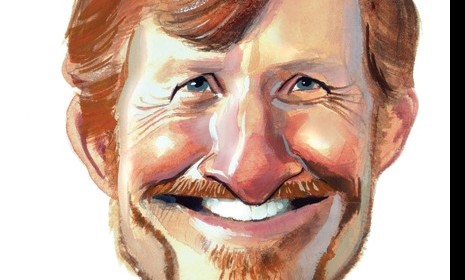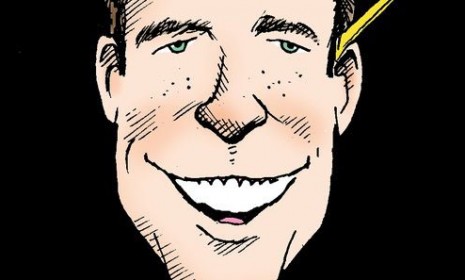Issue of the week: The lessons of Lehman’s downfall
A year after Lehman's bankruptcy, economists, market professionals, and policymakers are fiercely debating whether the U.S. should have propped up the investment bank and whether its downfall fueled the worst economic crisis since the Depression.
A free daily email with the biggest news stories of the day – and the best features from TheWeek.com
You are now subscribed
Your newsletter sign-up was successful
Could the credit crisis have been avoided? asked Bob Ivry and Christine Harper in Bloomberg.com. A year after CEO Richard Fuld led Lehman Brothers into the largest bankruptcy in history, economists, market professionals, and policymakers are fiercely debating whether the U.S. should have propped up the 164-year-old investment bank and whether its downfall fueled “the worst financial crisis since the Great Depression.” For all the controversy, one thing is clear: Then–Treasury Secretary Henry Paulson and then–New York Federal Reserve Bank President Timothy Geithner, now the treasury secretary, had ample warning that its collapse could unleash financial Armageddon. “They put the entire financial system at risk, and they didn’t have to,” says Harvey Miller, Lehman’s bankruptcy attorney. “They were warned.”
The consequences of Washington’s inaction were swift and devastating, said Larry Elliott and Jill Treanor in the London Guardian. Lehman’s demise “raised fears that any bank, anywhere in the world, was vulnerable to collapse.” Within days, Bank of America swooped in to acquire Merrill Lynch, which appeared set to follow Lehman into oblivion, while in Britain, Lloyds Bank came to the rescue of HBOS, one of Britain’s biggest real estate lenders. Those bailouts would not have been necessary if Washington had supported Lehman. “It was a catastrophic error,” said Sir John Gieve, deputy governor of the Bank of England. “It caused a loss of confidence in U.S. authorities’ ability to handle the financial crisis.”
The consequences are even more far-reaching than that, said Allan Meltzer in The Wall Street Journal. Allowing Lehman to fail “was one of the worst blunders in Federal Reserve history.” The panic triggered by Lehman’s failure was so pervasive that pundits were soon predicting that the world was on the brink of another Great Depression, and U.S. lawmakers were stampeded into passing a $787 billion stimulus bill. The crisis thus gave the new Obama administration a “pretext”
The Week
Escape your echo chamber. Get the facts behind the news, plus analysis from multiple perspectives.

Sign up for The Week's Free Newsletters
From our morning news briefing to a weekly Good News Newsletter, get the best of The Week delivered directly to your inbox.
From our morning news briefing to a weekly Good News Newsletter, get the best of The Week delivered directly to your inbox.
to redistribute income and carve out a greater economic role for the federal government. Those policies threaten to retard America’s growth for decades to come. That may not be what Paulson and Geithner had intended, but that’s the price of their misjudgment.
The crisis would probably not have played out any differently if the feds had rescued Lehman, said Steven Pearlstein in The Washington Post. “Financial markets were already on edge” before Lehman fell. In that feverish atmosphere, signs of trouble at any high-profile institution would have triggered panic. “Lehman happened to be the one that came along.” And whether or not Lehman fell, Citigroup, AIG, and other firms would still have needed federal aid. Lehman’s collapse accelerated not only a financial crisis that was already inevitable, it also “accelerated a global policy response” that prevented a total meltdown of the financial system. “Far from being a mistake, letting Lehman fail may have turned out to have been the best thing” policymakers could have done.
A free daily email with the biggest news stories of the day – and the best features from TheWeek.com
-
 Political cartoons for February 16
Political cartoons for February 16Cartoons Monday’s political cartoons include President's Day, a valentine from the Epstein files, and more
-
 Regent Hong Kong: a tranquil haven with a prime waterfront spot
Regent Hong Kong: a tranquil haven with a prime waterfront spotThe Week Recommends The trendy hotel recently underwent an extensive two-year revamp
-
 The problem with diagnosing profound autism
The problem with diagnosing profound autismThe Explainer Experts are reconsidering the idea of autism as a spectrum, which could impact diagnoses and policy making for the condition
-
Issue of the week: Who killed the Twinkie?
feature The seemingly imperishable Twinkie has finally met its match, and its name is Big Labor.
-
Issue of the week: Apple’s patent victory over Samsung
feature Apple's “sweeping victory” is among the biggest intellectual-property triumphs on record.
-
Issue of the week: Goldman Sachs’s ‘toxic’ culture
feature Greg Smith’s stinging public resignation from Goldman Sachs landed on Wall Street “like a bomb.”
-
Issue of the week: Can a mortgage deal revive housing?
feature Five big banks reached a settlement with state and federal officials to pay $26 billion to offset some of the damage caused by their misdeeds in the foreclosure crisis.
-
Issue of the week: Europe gets downgraded
feature Standard & Poor's lowered the credit rating for nine European nations, indicating that Europe has not yet convincingly dealt with the debt crisis.
-
 Tom Toles: Cartoonist of the Year
Tom Toles: Cartoonist of the Yearfeature Meet the winner of The Week's Cartoonist of the Year award
-
 Cartoonist of the Year finalists
Cartoonist of the Year finalistsfeature A brief look at this year's nominees
-
Issue of the week: Calling out the crash’s culprits
feature The Senate's Permanent Subcommittee on Investigations has just published its 635-page report on the financial crisis.